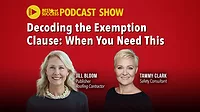Understanding the FFCRA’s Small Business Exemption

By Benjamin Briggs & Elliot Haney
On March 18, President Donald Trump signed into law the Families First Coronavirus Response Act (FFCRA), which includes two separate laws regarding paid leave for employees: (1) the Emergency Paid Sick Leave Act (EPSLA), and (2) the Emergency Family Medical Leave Expansion Act (EFMLEA). The FFCRA and these new leave laws went into effect in April and will remain in effect through Dec. 31, 2020.
Subsequently, on April 6, the U.S. Department of Labor (DOL) published temporary regulations, 29 C.F.R. 826, governing the enforcement of the FFCRA. Significantly, section 826.40(b) of the temporary regulations codifies the small business exemption referenced in the FFRCA. This exemption limits the paid leave small businesses are otherwise required to provide under the two new leave laws. Accordingly, it is important that employers understand whether their business qualifies for the small business exemption and, if so, what the scope of the exemption is.
Scope of the Exemption: What a Qualified Small Business is Exempt from Doing?
The two new leave laws — the EPSLA and the EFMLEA — collectively require employers with fewer than 500 employees to provide paid leave to employees for six specific reasons. One of those six reasons is when the employee is unable to work because the employee needs to care for his or her child whose school is closed or childcare is unavailable due to COVID-19 precautions. If an employee needs leave for this qualifying reason, the EPSLA and EFMLEA collectively require businesses to provide eligible employees with up to 12 weeks of paid, job-protected leave. However, under the small business exemption, qualifying businesses are not required to provide leave to employees who are unable to work because they need to care for a child whose school is closed or childcare is unavailable due to COVID-19 precautions.
Note: a qualifying small business is still required to provide up to two weeks of paid leave to employees for the other five qualifying reasons set forth in the EPSLA, and is still required to post in the workplace a notice of employee rights under the EPSLA. The small business exemption simply exempts a qualifying small business from providing leave to employees who seek leave for one specific qualifying reason, i.e., to care for a child whose school or childcare is closed.
What is Considered a “Small Business” Under the Exemption?
The small business exemption applies to businesses with fewer than 50 employees at the time the employee in question requests leave under the FFCRA.
What Criteria Must a Small Business Meet to be Eligible for the Exemption?
The small business exemption does not apply to every business with fewer than 50 employees. Rather, the exemption only applies when providing paid leave to the employee seeking leave to care for his or her child would “jeopardize the viability of” the small business “as a going concern.” Specifically, to qualify for the exemption, an “authorized officer” of the small business must determine that at least one of the following is true:
- The small business cannot afford to provide the requested leave because doing so would cause the business’ expenses and financial obligations to exceed available business revenue and cause the business to cease operating at a minimal capacity; or
- The employee requesting leave has specialized skills, knowledge of the business, or responsibilities, such that the absence of that employee would pose a substantial risk to the financial health or operational capabilities of the small business; or
- The employee requesting leave performs services that are necessary for the business to operate at a minimum capacity, and there are not sufficient workers available to perform those services while the employee is on leave.
In other words, small businesses must evaluate each leave request on a case-by-case basis and determine if: (i) it cannot afford to provide the requested leave, (ii) the employee requesting leave has specialized traits that make him or her critical to the business’ operations, or (iii) the employee requesting leave performs essential services and there are insufficient workers available to perform those services while the employee is out on leave.
What Must I Do to Use the Small Business Exemption?
According to the temporary regulations, in order to elect the small business exemption, you must simply document the determination of your authorized officer and retain that documentation in your files for four years. The regulations actually instruct employers not to send any documentation to the DOL regarding the small business exemption. In other words, if an authorized officer determines that the small business exemption applies to a particular leave request, based on the criteria discussed above, then you can deny the leave request on that basis without taking further action other than internally documenting the determination.
Disclaimer: The information contained in this article is for general educational information only. This information does not constitute legal advice, is not intended to constitute legal advice, nor should it be relied upon as legal advice for your specific factual pattern or situation.
Benjamin Briggs is a Partner at Cotney Construction Law who represents clients in all aspects of labor and employment law. Elliot Haney is an Attorney at Cotney Construction Law who practices in all areas of construction law. Cotney Construction Law is an advocate for the roofing industry and serves as General Counsel for NRCA, FRSA, NWIR, RT3, TARC, WSRCA and several other roofing associations. For more information, visit www.cotneycl.com
Looking for a reprint of this article?
From high-res PDFs to custom plaques, order your copy today!







